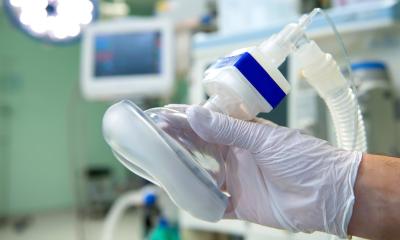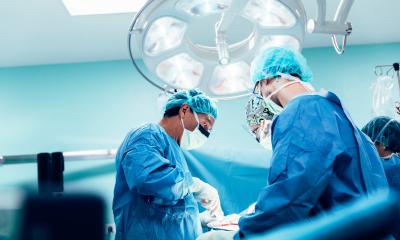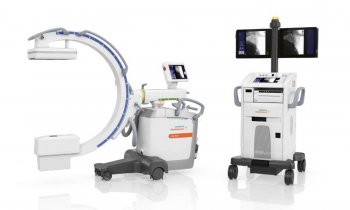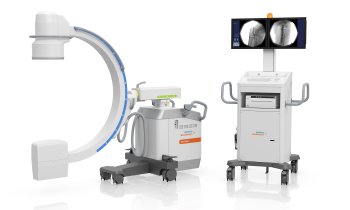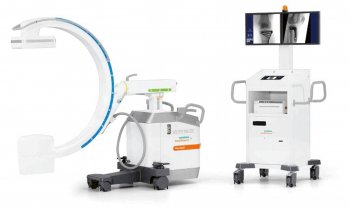Pre-operative risk stratification
Anaesthetists are part of a team providing optimal peri-operative care for the patient
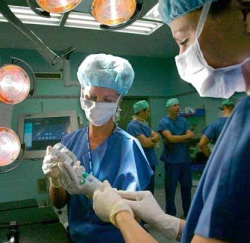
care for the patient
A key part of pre-operative risk stratification must include cognitive and frailty assessments of patients in order to help identify those who may be most at risk of post-operative cognitive dysfunction, according to a leading anaesthetist. Dr George Djaiani MD, Associate Professor of Anaesthesia at Toronto General Hospital and the University of Toronto, warns that post-operative cognitive dysfunction (POCD) and delirium are relatively common after major surgery, particularly amongst elderly patients. He said anaesthetists could play a key role in highlighting those who may suffer POCD and as a consequence must be given an influential part in planning the surgery and treatment. ‘Anaesthetists are often perceived as physicians who put people to sleep. However, the first patient encounter occurs in the preoperative clinic, well before surgical intervention takes place, except for emergencies. Furthermore, anaesthetic care extends to the postoperative period as well. ‘Consequently, anaesthetists assume a role of peri-operative physicians being part of the team providing optimal peri-operative care for the patient. Identification of patients at risk of POCD and delirium preoperatively, choosing the optimal anaesthetic and cerebral monitoring techniques during surgery, and provision of best analgesia after surgery is pivotal in improving cerebral protection peri-operatively.’ Figures show that POCD and delirium occurs in 6-30% of patients after cardiac and major non-cardiac surgery, while one year after surgery it is around 5-15%. With POCD more common in elderly patients, he said that the peri-operative team would face growing challenges to offer better outcomes as the elderly population presenting for surgery increases. ‘Pre-operative risk stratification models should include some cognitive, frailty, and daily living activity assessments to establish baseline and determine brain reserve,’ he points out. ‘Impaired cerebral auto-regulation, and altered cerebral reactivity may get recognised during the pre-operative “brain stress testing”.’ ‘Sometimes, for patients at high risk, less invasive surgery or at times even medical management might be a preferred option. If it is decided to proceed with surgery, more rigorous cerebral monitoring may be required and certain pharmacological agents should be avoided. Anaesthetists have been in the driving seat for years testing different hypotheses, including pharmacological agents as well as different equipment and anaesthetic techniques to minimise POCD and delirium after surgery.’ Among the pharmacological agents he suggests should be avoided are benzodiazepines, and opioid use should be minimised, though continuing the use of statins during the peri-operative period. At Toronto General Hospital there are currently five anaesthesia-driven trials looking at reducing delirium after surgery. However, as there is no known treatment for POCD at this stage, Dr Djaiani said, it is important to continue POCD and delirium research to ‘better understand the pathophysiology of these complex conditions and develop new prevention and treatment strategies.’ Teamwork is paramount in helping to improve outcomes, with the patient’s family, psychiatry, surgery and nurses working together to achieve best outcomes but Dr Djaiani said that less invasive surgery and further development of interventional radiology and cardiology techniques will also have an impact and modify the type of anaesthesia used for procedures. ‘Recently,’ he added, ‘we reported that endovascular repair of abdominal aortic aneurysm was associated with less delirium after surgery compared to the open approach.’
PROFILE
Dr George Djaiani is Associate Professor of Anaesthesia, Director of the Cardiac Anaesthesia Fellowship Research, and Associate Director Anaesthesia Research Cardiovascular Anaesthesia and Intensive Care at Toronto General Hospital and the University of Toronto. An authority on post-operative cognitive dysfunction (POCD), the current focus of his research team is directed at identifying risk factors, managing perioperative care, and reducing short- and long-term adverse outcomes after cardiac surgery. The main area of his research concentrates on brain injury and cardiac surgery, as well as perioperative coagulopathy and thrombosis identifying aetiology, pathophysiology, prevention, and treatment. As a key speaker at the recent Association of Anaesthetists of Great Britain and Ireland, Dr Djaiani presented the session Postoperative cognitive dysfunction - How much is down to the anaesthetist?
05.11.2012




